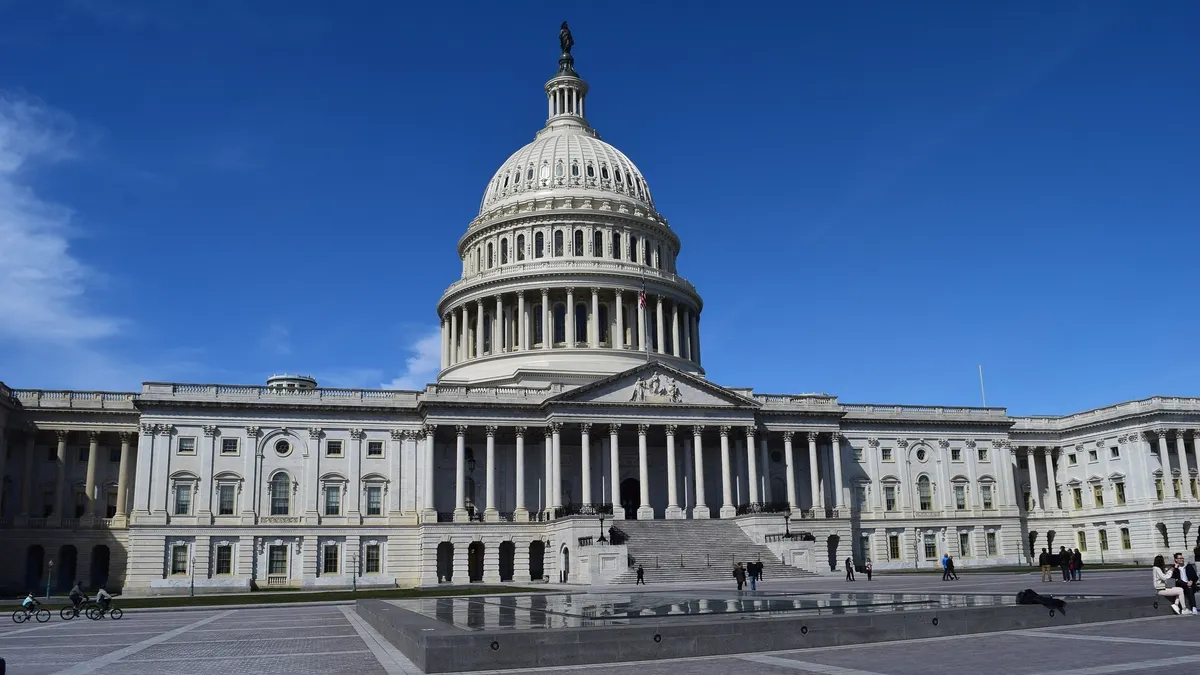Dive Brief:
-
The new coronavirus relief effort by House Democrats earmarks more than $37 billion for higher education and makes clear that international and undocumented college students can't be excluded from emergency aid.
-
The proposed $3 trillion Health and Economic Recovery Omnibus Emergency Solutions (HEROES) Act, was immediately written off by Republican lawmakers, making it unlikely to pass in its current form.
-
However, experts say the allocation for the industry is in line with what colleges need to weather the economic crisis caused by the pandemic.
Dive Insight:
Congress designated roughly $14 billion for higher education in its prior aid package, an amount the American Council on Education (ACE), the sector's leading lobbyist, deemed "woefully inadequate."
Most of that money went to institutions to defray coronavirus-related expenses, though the law dictated that colleges needed to pass at least half of their individual allocations to students in the form of emergency grants. The U.S. Department of Education drew ire when it barred international and undocumented students from getting the grants.
The HEROES Act would reverse the department's decision, specifying that it can't restrict which students receive aid. Colleges that already gave those populations grants also couldn't be penalized for having done so.
The bill sets aside $27 billion for public institutions out of a $90 billion state stabilization fund that would support K-12 and postsecondary education.
Governors would distribute their shares of that $27 billion to public colleges in their states based on how many students they enroll, weighted heavily toward how many receive Pell Grants, a measure of financial need on a campus.
To claim that money, however, they would need to commit to keeping their funding levels for higher ed the same as in preceding years through the 2022 fiscal year. Achieving this, however, would be “really challenging” for states, said Clare McCann, deputy director for federal higher education policy at left-leaning think tank New America.
Following the Great Recession, states cut higher ed spending to the point that some still haven't returned to pre-2008 levels, according to a recent report.
Still, structuring the aid this way would mean states couldn't turn to higher ed for cuts as they did in previous periods of economic contraction, said James Kvaal, president of The Institute for College Access and Success. His organization supports funneling the funding through states.
"The money otherwise never gets put back when the economy comes back, and that's the single biggest factor in driving up tuition in public schools," Kvaal said.
Colleges get an additional $10 billion or so in the bill, $7 billion of which would be for private, nonprofit colleges to address coronavirus expenses. That funding would be distributed in the same way as the money from the state stabilization fund.
About $1.7 billion of the $10 billion is pegged for minority-serving institutions. And $1.4 billion is earmarked for other public and nonprofit institutions with unmet needs, such as those that only offer distance learning programs.
The bill reserves $300 million for an “institutional stabilization program.” Struggling colleges usually must put up a letter of credit if their federal composite score — a controversial measure of a college's financial health — falls to a certain level.
A letter of credit can be difficult for financially challenged colleges to obtain, so this proposal would allow them to instead report to the Education Department their liquidity and student transcripts, financial and other records, along with a teach-out plan, or in some cases, a teach-out agreement. The funds would be used to help them put together and maintain those records.
The bill also includes generous protections for federal loan borrowers. Previous legislation suspended monthly payments on federal loans, which had been made interest-free, through the end of September. The HEROES Act extends this reprieve through at least Sept. 30, 2021, but potentially longer depending on economic conditions. It also proposes canceling up to $10,000 worth of federal loan debt per borrower and adds similar protections for private loan borrowers.
Loan forgiveness would likely prove extremely costly and put off some Republican lawmakers, McCann said. Senate Republicans have already rejected the bill. Sen. John Thune, R-S.D., the No. 2 Republican in the Senate, criticized it, telling reporters Tuesday that "it's not going anywhere."
ACE and other groups had asked federal leaders for at least $47 billion in the next aid package, saying colleges' budgets had already been wrecked by refunds of room and board fees and other expenses.









